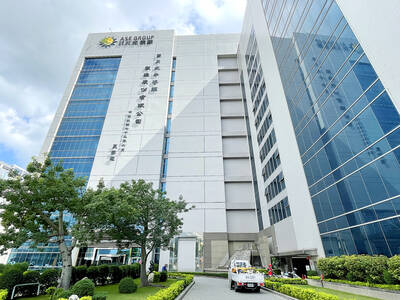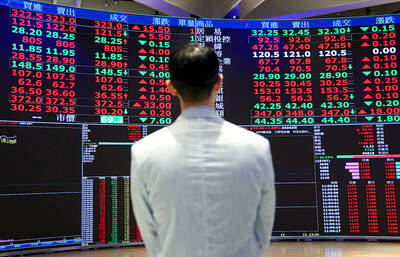The Financial Supervisory Commission (FSC) said yesterday it would consider easing capital requirements for financial companies, allowing domestic securities brokerages, futures and investment and trust firms to better utilize their funds.
FSC Vice Chairman Wu Tang-chieh (吳當傑) made the announcement after a meeting between FSC chairman Chen Yuh-chang (陳裕璋) and 20 executives from local brokerages, futures and investment and trust companies.
“The commission will soon review the possibility of lowering loss provisions, special reserves and capital limits on overseas investment as proposed by the firms,” Wu said.
Yesterday’s meeting was the second face-to-face meeting between Chen and local financial representatives in 10 days. On Aug. 25, Chen met executives from financial holding companies and banks to discuss investment in China, prompting the commission to approve local financial firms owning a controlling stake in finance leasing or venture capital companies in China, the next day.
Such meetings were considered necessary as many local financial firms have expressed concern over new accounting rules, overseas competition and cross-srait financial links.
Securities brokerages yesterday called on the FSC to allow them to invest up to 40 percent of their net worth, instead of paid-in capital, in overseas investments, as most have larger net worth than paid-in capital, Wu said.
Wu said the commission is likely to consider this favorably as all brokerages meet the minimum 200 percent requirement on risk-based capital ratios with some posting as much as 400 percent or 500 percent.
The commission also agreed to consider lowering default and loss provision as well as special reserve thresholds, Wu said.
Futures companies urged the commission to help reduce the transactions tax, saying a cut could boost the national treasury through increased turnover.
Wu said the commission shared their view and would talk to the Ministry of Finance on the matter.
As for China, Wu said the commission would bring up the issue at future cross-strait talks as the matter needs to be approved by China.
The commission chairman will meet with heads from local insurance companies in a week or two, Wu said.

EXPANSION: The investment came as ASE in July told investors it would accelerate capacity growth to mitigate supply issues, and would boost spending by 16 percent ASE Technology Holding Co (ASE, 日月光投控), the world’s biggest chip assembly and testing service provider, yesterday said it is investing NT$17.6 billion (US$578.6 million) to build a new advanced chip packaging facility in Kaohsiung to cope with fast-growing demand from artificial intelligence (AI), high-performance-computing (HPC) and automotive applications. The new fab, called K18B, is to commence operation in the first quarter of 2028, offering chip-on-wafer-on-substrate (CoWoS) chip packaging and final testing services, ASE said in a statement. The fab is to create 2,000 new jobs upon its completion, ASE said. A wide spectrum of system-level chip packaging technologies would be available at

Taiwan’s foreign exchange reserves hit a record high at the end of last month, surpassing the US$600 billion mark for the first time, the central bank said yesterday. Last month, the country’s foreign exchange reserves rose US$5.51 billion from a month earlier to reach US$602.94 billion due to an increase in returns from the central bank’s portfolio management, the movement of other foreign currencies in the portfolio against the US dollar and the bank’s efforts to smooth the volatility of the New Taiwan dollar. Department of Foreign Exchange Director-General Eugene Tsai (蔡炯民)said a rate cut cycle launched by the US Federal Reserve

HEAVYWEIGHT: The TAIEX ended up 382.67 points, with about 280 of those points contributed by TSMC shares alone, which rose 2.56 percent to close at NT$1,400 Shares in Taiwan broke records at the end of yesterday’s session after contract chipmaker Taiwan Semiconductor Manufacturing Co (TSMC, 台積電) hit a fresh closing-high amid enthusiasm toward artificial intelligence (AI) development, dealers said. The TAIEX ended up 382.67 points, or 1.45 percent, at the day’s high of 26,761.06. Turnover totaled NT$463.09 billion (US$15.22 billion). “The local main board has repeatedly hit new closing highs in the past few sessions as investors continued to embrace high hopes about AI applications, taking cues from a strong showing in shares of US-based AI chip designer Nvidia Corp,” Hua Nan Securities Co (華南永昌證券) analyst Kevin Su

Nvidia Corp’s major server production partner Hon Hai Precision Industry Co (鴻海精密) reported 10.99 percent year-on-year growth in quarterly sales, signaling healthy demand for artificial intelligence (AI) infrastructure. Revenue totaled NT$2.06 trillion (US$67.72 billion) in the last quarter, in line with analysts’ projections, a company statement said. On a quarterly basis, revenue was up 14.47 percent. Hon Hai’s businesses cover four primary product segments: cloud and networking, smart consumer electronics, computing, and components and other products. Last quarter, “cloud and networking products delivered strong growth, components and other products demonstrated significant growth, while smart consumer electronics and computing products slightly declined,” compared with the